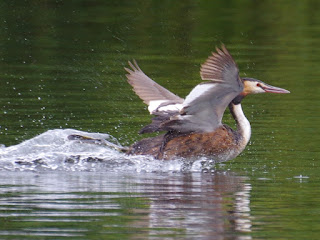The rowan trees on Buck Hill are already attracting birds to their berries. Here a Magpie is enjoying them.
Some late-hatched young Great Tits are still calling for their parents to feed them.
It was rather windy, and the male Little Owl waited till late afternoon before coming out on to his usual branch in the maple tree.
A Cormorant was fishing in the Long Water under the marble fountain of the Italian Garden. It caught several small perch. Here predator and prey exchange glances before one of them meets its end.
Shortly afterwards the Cormorant caught an enormous fish. It dragged its victim around the lake and I thought it was never going to swallow it. But somehow it did, and swam off. Perhaps even Cormorants feel full sometimes.
The Great Crested Grebe family from the Serpentine island were in the same hard-to-see place off the reed bed to the east of the Lido.
Meanwhile, the two nests on the Long Water are still going. This one, in a reed bed opposite the fallen horse chestnut tree, should be hatching soon.
The one under the bridge is not so far advanced, and it may be a week or ten days before anything happens here.
The two grebes that were off their nests came too close to each other and there was a brisk chase up the lake. This picture shows a grebe's takeoff run, in which it is largely propelled by its feet before its small wings reach flying speed.
The park has always seemed to be seriously lacking in amphibians. But today I was talking to one of the gardeners, Big Dave, who has been working here for a long time. He said that when they dredged up weed on the Long Water, they often found newts in it, and also that there were frogs in the reed beds on the east side of the lake and on the bank above it. There were also frogs in a pond in Kensington Palace gardens, though it's unsure whether there still are. I would expect there to be some in the little pond in the Ranger's Lodge garden, but I have never seen any amphibian in the park myself.









Award for good behaviour for an owl, discouraging seagulls. This is not a joke (I think). http://www.theguardian.com/education/2015/jul/29/overdue-recognition-owl-issued-library-card-after-solving-universitys-gull-woes
ReplyDeleteEvery university should have one.
ReplyDeleteWhen I clicked on your close-up photo of the cormorant and the tiny fish which he was about to swallow, it showed every drop of water on the cormorant's back, and the brilliant eyes of both creatures - a marvellous focused shot.
ReplyDeleteIt was a very lucky shot, as the Cormorant was right under the parapet of the Italian Garden and I had the luxury of a near close-up.
DeleteGreat capture! That looks like a big fish (you know what kind?) staring down the bird's throat here! So could the cormorant really manage to gulp down that entire thing okay?? Does the fight put up a good fight, if eaten, is it swallowed wriggling/alive all the way as well?!
ReplyDelete-Kyle
It looks like a carp. The fish wriggle, but there's nothing much they can do, and down they go.
DeleteJust stumbled across this interesting capture again! That must be some hungry bird!
DeleteStill, it seems difficult to me that the heron can deal with this large fish! So the bird was actually able to fit (swallowed alive?!) that whole thing down its long/skinny throat completely somehow?? I have never witnessed an event like this before.
I feel somewhat perplexed over how it actually happens, wouldn't the fish stand a chance of escaping or even damaging (it’s sharp fins, wriggling, biting, etc.) the bird's throat/stomach if eaten in that condition?!
It’s hard for me to imagine that the potential meal (wouldn't the prey also go into a desperate "survival mode" once it realized that it hit the stomach?) doesn't turn around inside the elastic gullet and how the bird can keep down/digest such an object with no issues?
I don't have much knowledge about these events and am mostly curious, I appreciate any feedback/explanation.
Sorry for all of the questions, have a good week ;)
-Kyle
What an old post to find a comment on. No one will read this reply except you, maybe.
DeleteI think the point is that the fish, swallowed head first, will hit a grinder on the way down -- the bird's muscular gizzard full of churning stones, before it reaches its stomach, and that will surely kill it.